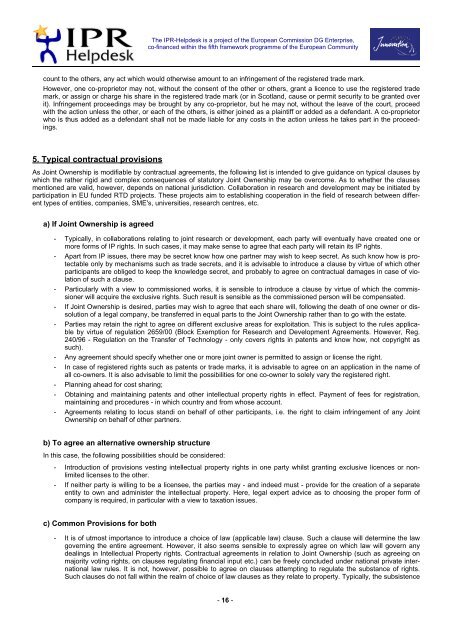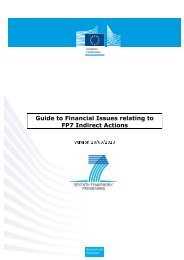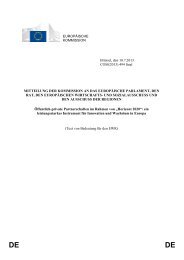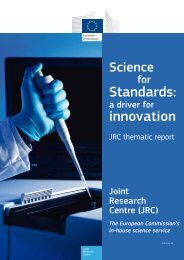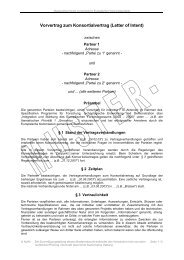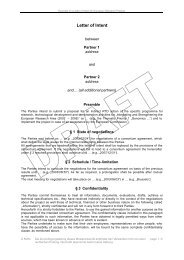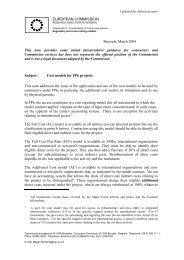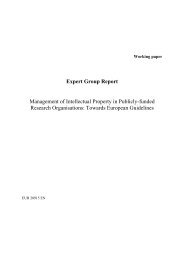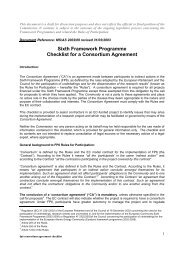Joint Ownership in Intellectual Property Rights - KoWi
Joint Ownership in Intellectual Property Rights - KoWi
Joint Ownership in Intellectual Property Rights - KoWi
You also want an ePaper? Increase the reach of your titles
YUMPU automatically turns print PDFs into web optimized ePapers that Google loves.
The IPR-Helpdesk is a project of the European Commission DG Enterprise,<br />
co-f<strong>in</strong>anced with<strong>in</strong> the fifth framework programme of the European Community<br />
count to the others, any act which would otherwise amount to an <strong>in</strong>fr<strong>in</strong>gement of the registered trade mark.<br />
However, one co-proprietor may not, without the consent of the other or others, grant a licence to use the registered trade<br />
mark, or assign or charge his share <strong>in</strong> the registered trade mark (or <strong>in</strong> Scotland, cause or permit security to be granted over<br />
it). Infr<strong>in</strong>gement proceed<strong>in</strong>gs may be brought by any co-proprietor, but he may not, without the leave of the court, proceed<br />
with the action unless the other, or each of the others, is either jo<strong>in</strong>ed as a pla<strong>in</strong>tiff or added as a defendant. A co-proprietor<br />
who is thus added as a defendant shall not be made liable for any costs <strong>in</strong> the action unless he takes part <strong>in</strong> the proceed<strong>in</strong>gs.<br />
5. Typical contractual provisions<br />
As <strong>Jo<strong>in</strong>t</strong> <strong>Ownership</strong> is modifiable by contractual agreements, the follow<strong>in</strong>g list is <strong>in</strong>tended to give guidance on typical clauses by<br />
which the rather rigid and complex consequences of statutory <strong>Jo<strong>in</strong>t</strong> <strong>Ownership</strong> may be overcome. As to whether the clauses<br />
mentioned are valid, however, depends on national jurisdiction. Collaboration <strong>in</strong> research and development may be <strong>in</strong>itiated by<br />
participation <strong>in</strong> EU funded RTD projects. These projects aim to establish<strong>in</strong>g cooperation <strong>in</strong> the field of research between different<br />
types of entities, companies, SME's, universities, research centres, etc.<br />
a) If <strong>Jo<strong>in</strong>t</strong> <strong>Ownership</strong> is agreed<br />
- Typically, <strong>in</strong> collaborations relat<strong>in</strong>g to jo<strong>in</strong>t research or development, each party will eventually have created one or<br />
more forms of IP rights. In such cases, it may make sense to agree that each party will reta<strong>in</strong> its IP rights.<br />
- Apart from IP issues, there may be secret know how one partner may wish to keep secret. As such know how is protectable<br />
only by mechanisms such as trade secrets, and it is advisable to <strong>in</strong>troduce a clause by virtue of which other<br />
participants are obliged to keep the knowledge secret, and probably to agree on contractual damages <strong>in</strong> case of violation<br />
of such a clause.<br />
- Particularly with a view to commissioned works, it is sensible to <strong>in</strong>troduce a clause by virtue of which the commissioner<br />
will acquire the exclusive rights. Such result is sensible as the commissioned person will be compensated.<br />
- If <strong>Jo<strong>in</strong>t</strong> <strong>Ownership</strong> is desired, parties may wish to agree that each share will, follow<strong>in</strong>g the death of one owner or dissolution<br />
of a legal company, be transferred <strong>in</strong> equal parts to the <strong>Jo<strong>in</strong>t</strong> <strong>Ownership</strong> rather than to go with the estate.<br />
- Parties may reta<strong>in</strong> the right to agree on different exclusive areas for exploitation. This is subject to the rules applicable<br />
by virtue of regulation 2659/00 (Block Exemption for Research and Development Agreements. However, Reg.<br />
240/96 - Regulation on the Transfer of Technology - only covers rights <strong>in</strong> patents and know how, not copyright as<br />
such).<br />
- Any agreement should specify whether one or more jo<strong>in</strong>t owner is permitted to assign or license the right.<br />
- In case of registered rights such as patents or trade marks, it is advisable to agree on an application <strong>in</strong> the name of<br />
all co-owners. It is also advisable to limit the possibilities for one co-owner to solely vary the registered right.<br />
- Plann<strong>in</strong>g ahead for cost shar<strong>in</strong>g;<br />
- Obta<strong>in</strong><strong>in</strong>g and ma<strong>in</strong>ta<strong>in</strong><strong>in</strong>g patents and other <strong>in</strong>tellectual property rights <strong>in</strong> effect. Payment of fees for registration,<br />
ma<strong>in</strong>ta<strong>in</strong><strong>in</strong>g and procedures - <strong>in</strong> which country and from whose account.<br />
- Agreements relat<strong>in</strong>g to locus standi on behalf of other participants, i.e. the right to claim <strong>in</strong>fr<strong>in</strong>gement of any <strong>Jo<strong>in</strong>t</strong><br />
<strong>Ownership</strong> on behalf of other partners.<br />
b) To agree an alternative ownership structure<br />
In this case, the follow<strong>in</strong>g possibilities should be considered:<br />
- Introduction of provisions vest<strong>in</strong>g <strong>in</strong>tellectual property rights <strong>in</strong> one party whilst grant<strong>in</strong>g exclusive licences or nonlimited<br />
licenses to the other.<br />
- If neither party is will<strong>in</strong>g to be a licensee, the parties may - and <strong>in</strong>deed must - provide for the creation of a separate<br />
entity to own and adm<strong>in</strong>ister the <strong>in</strong>tellectual property. Here, legal expert advice as to choos<strong>in</strong>g the proper form of<br />
company is required, <strong>in</strong> particular with a view to taxation issues.<br />
c) Common Provisions for both<br />
- It is of utmost importance to <strong>in</strong>troduce a choice of law (applicable law) clause. Such a clause will determ<strong>in</strong>e the law<br />
govern<strong>in</strong>g the entire agreement. However, it also seems sensible to expressly agree on which law will govern any<br />
deal<strong>in</strong>gs <strong>in</strong> <strong>Intellectual</strong> <strong>Property</strong> rights. Contractual agreements <strong>in</strong> relation to <strong>Jo<strong>in</strong>t</strong> <strong>Ownership</strong> (such as agree<strong>in</strong>g on<br />
majority vot<strong>in</strong>g rights, on clauses regulat<strong>in</strong>g f<strong>in</strong>ancial <strong>in</strong>put etc.) can be freely concluded under national private <strong>in</strong>ternational<br />
law rules. It is not, however, possible to agree on clauses attempt<strong>in</strong>g to regulate the substance of rights.<br />
Such clauses do not fall with<strong>in</strong> the realm of choice of law clauses as they relate to property. Typically, the subsistence<br />
- 16 -


